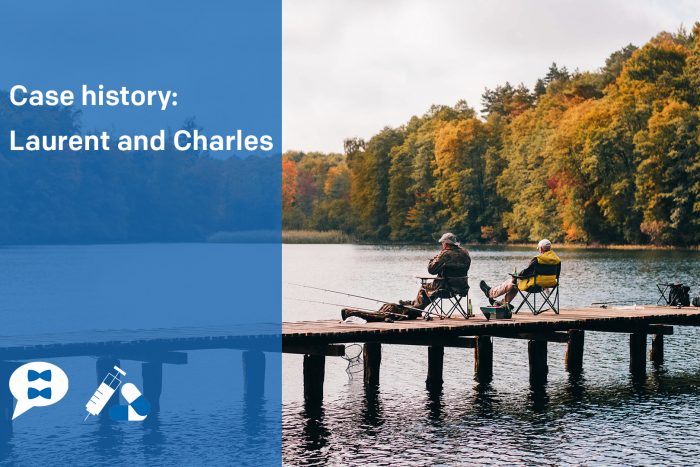Since we recently discussed the different treatment options and new molecules to treat prostate cancer, the next series of articles will be interspersed with case stories, comparing treatment choices based on different diagnosis.
We have already shared the stories of Franck and Paul (Jean François and Michel in the French version). Here are those of Larry and Charles, extracted from the new book edition Prostate Cancer – Understand the disease and its treatments, 2019.
“[…] Larry, 67 years old, Sales Representative”
“Larry plans to retire next year, buy a sailboat and travel the South Seas with his wife. Suddenly, his doctor informs him that he has localized prostate cancer, although it does not appear to be too aggressive. The tumour is at stage T1 and scores 6 (grades 3 +3) on the Gleason scale, and his PSA level is 5. The doctor presents the three treatment options—active surveillance, radical prostatectomy and radiation therapy—explaining the benefits and drawbacks of each. Larry is unsure. He takes his time to think about it, eventually deciding on active surveillance. Because it is likely that his cancer will progress slowly, he prefers to postpone treatment and enjoy his long-anticipated trip. He will see his doctor as soon as he gets.” (Fred Saad, MD, FRCSC and Michael McCormack, MD, FRCSC, 2019, p. 84)
“[…] Charles, 50 years old, Businessman”
“Charles works 40 hours a week, plays golf and jogs. During his last annual check-up, his doctor performed a digital rectal exam (DRE), and everything seemed normal. However, his PSA test results were a little high at 5.0 ng/mL. The doctor carried out a transrectal ultrasound (TRUS), found no abnormalities and collected some samples for biopsy. The pathologist determined that the prostate contained cancerous cells scoring 7 (grades 3 + 4) on the Gleason scale. Additional tests came up negative.
What does it all mean? While the DRE and the TRUS showed nothing, Charles does have cancer, although it is not very advanced. His options included radiation therapy and radical prostatectomy. Charles opted for surgery and the pathological tissue analysis showed his cancer was confined to the prostate (T2) and had not spread to the pelvic lymph nodes (N0). Charles has an excellent chance of being cured and will likely not require other treatment.” (Fred Saad, MD, FRCSC and Michael McCormack, MD, FRCSC, 2019, p. 75)
Take the time to visit each of our pages on this website, as well as our YouTube channel, in order to get familiar with the disease with our expert lectures, our section on available resources, the support that is offered to you.
Do you have any questions or concerns? Above all, do not hesitate. Contact us at 1 855 899-2873 to discuss with a nurse specializing in uro-oncology. It’s simple and free, like all our services.
Pages of our site that might interest you
Want to know more? Just click on one of the links below.
Am I at risk
Signs and symptoms
PROCURE news that may interest you
Each week, we publish a blog article. Here are a few for you.
Case stories: Réal, Jean-Michel and Louis
Case stories: Yvon and William
Case stories: Laurent and Charles
Case stories: Jean-François and Michel
I was ready for anything except… Jean’s story
Sources and references
Prostate Cancer – Understand the disease and its treatments; Fred Saad, MD, FRCSC and Michael McCormack, MD, FRCSC; Fifth edition, entirely revised and updated, 2019. © Fred Saad and Michael McCormack, 2019 – Annika Parance Publishing
Written by PROCURE. © All rights reserved – 2019



